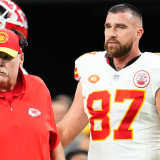Can't-miss Falcons storyline: NFL’s best pass rush is within reach for defense
The Falcons went out of their way to build a supporting cast around Vic Beasley

As football transforms into a more pass-reliant game, the primary objective in defensive scheming boils down to one simple creed: get the quarterback.
Two seasons ago, the Atlanta Falcons were among the worst in the NFL at doing just that. Last season, they were among the most improved, thanks mostly to the play of linebacker Vic Beasley, Jr., whose 15.5 sacks led the league.
It goes without saying that a major element in Atlanta's 11-win season and Super Bowl appearance last season, in addition to their prolific and balanced offensive prowess, was their ability to get this pressure on opposing passers.
As training camp rolls along and the Falcons look to repeat their 2016 successes, one question emerges among many: can the Falcons build the best pass rush in the NFL?
(The Falcons are back at training camp! Don't MISS anything as they prepare to try and return to the playoffs -- take five seconds to Sign up for our Free Falcons newsletter now!)
In 2015, the Falcons finished with 19 sacks, hurried the passer 70 times, and recorded 75 hits on 561 pass attempts, a 29.2 percent success rate. Last season, that last mark rose to 39 percent, as did total sacks (34, the most since their 37 sacks 10 seasons ago), over 655 pass attempts.
But advanced statistics tells a bleaker story. According to Football Outsiders' DVOA metric, the Falcons produced a mere 190 pressure plays out of 720 in total, a success rate of just 29.4 percent, ranking No. 20 overall in football.
They took a step in the right direction, but heading into this offseason, the organization knew that they would have to provide Beasley some help in the supporting cast. That they did, drafting Takkarist McKinley and Duke Riley, a pair of collegiate edge rushers, and signing veteran tackle Dontari Poe, a 340-pound behemoth who routinely attracts double- and triple-teams of blockers.
Among that trio, Poe is the one expected to make an impact immediately. From 2013 to 2014, Poe wrecked opposing blockers for 10.5 sacks. In the two years after then, however, that number fell to just 2.5, a decrease that likely was the result of a back surgery. But now, considerably lighter and presumably healthy, the team believes they got the best inside pass rusher in the business.
But that the Falcons picked two more rushers with their first two draft selections this year indicates to what degree the team is looking to address this position.
In 28 games at UCLA, McKinley emerged as the college game's best at pressuring quarterbacks, bringing heat on the passer on 21.4 percent of his rushes, according to Pro Football Focus, while adding 10 sacks and 18 tackles for loss. He has a burst off the line, the hands to fight off blockers, and the agility to spin out of blocks.
Deion Jones' successor at LSU, Riley didn't play a 12-game season until he was a senior, but proved most productive with the increase in playing time, grabbing 93 tackles (the Tigers' most), nine tackles for loss, and the SEC's sixth-most tackles per game (7.8). At 6-foot-1, some scouts consider him undersized for the position, but he has the sideline speed to rush the line and the instincts to find the right gap to exploit.
Suddenly, the Falcons have a very promising rotation, with Poe and Grady Jarrett (three sacks in 2016, and three more against Tom Brady in the Super Bowl) on the inside, McKinley bringing heat from the edge, and Riley and sack-leader Beasley roaming free behind them. This new supporting cast enables the team to reverse one of their self-professed weaknesses last season.
Head coach Dan Quinn says he relied too often on sending the blitz in order to get adequate pressure on quarterbacks, but this season hopes he can make a greater impact by rushing just his front four.
"That allows you the flexibility to do things," Quinn said. "When you play a four-man front, you want to make sure that you can affect the quarterback in the pass game with your rush and be able to drop and play four underneath, or however you want to play your coverages, without having to devote an extra player to do that."
If Quinn and his coaches can figure out the right rotation, the Falcons can build on one of the most improved pass rushes in football, and maybe hold a lead or two in the postseason.






